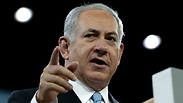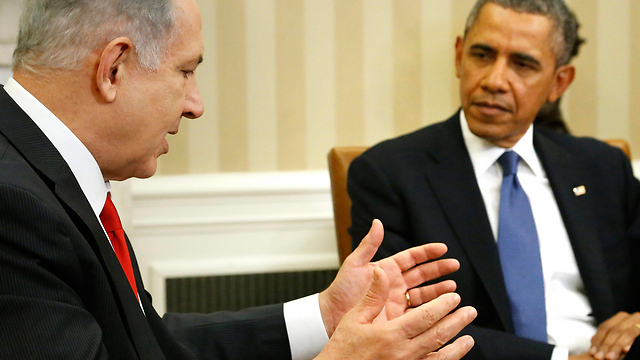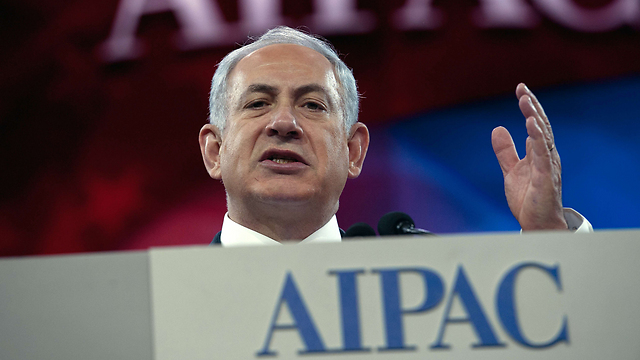
Netanyahu in US
צילום: AFP
Netanyahu: Israel willing to make tough choice – are Palestinians?
Speaking to Israeli press for first time since talks began, Netanyahu reiterates support for two-state solution, but promises: I will not uproot settlements.
Prime Minister Benjamin Netanyahu suggested Friday that some Jewish settlements would remain under Palestinian sovereignty if the two sides struck a peace deal – a move he said was contingent on Palestinians' willingness to compromise.
Netanyahu made the comments during an interview to Israel's Channel 2, it was the prime minister's first interview to the Hebrew press on the subject since renewed peace talks began under the auspices of US Secretary of State John Kerry.
In the interview, Netanyahu was asked whether it was possible to make peace with the Palestinians without uprooting West Bank settlements – which he had promised not do – and attempted to shift the focus back to the Palestinians.
"Let's first see if the Palestinians are even willing to enter negotiations, because the way I see it, it seems to me that now they are very very far from that, they think they will be able to continue to take their rejectionist route, with unrealistic demands, petitioning the UN; distancing themselves from the question of how they will compromise, how they will recognize the Jewish State, how they understand the right of return (and) how they bring about the end of the conflict."
Related stories:
- Netanyahu says Israel would give up 'some settlements' for peace
- Abbas: 'No way' for recognition of Israel as Jewish state
- Obama: Israel faces bleak future should talks fail
Netanyahu reiterated that he does not conflate making peace with the Palestinians and clearing the West Bank of settlements, saying, "There will no act of eviction and I still do not know what the borders will be (for a final status agreement). But the question (regarding final borders) is premature, because the Palestinians, it seems to me, are not prepared to make decisions."
Netanyahu nonetheless conceded that "some of settlements will not be included in the (final) agreement. That's clear. Everyone understands that. I will ensure the number will be as small as possible, as far as is possible, if we get there," Netanyahu said attempting to reconcile his position and the need to reach a two state solution.
In the past, the prime minister had raised the possibility that some settlers will remain under Palestinians sovereignty should a Palestinian state be formed in the West Bank, but he emphasized that he would not leave any settler "without the full protection we give each Israeli."
Nonetheless, Netanyhau attempted to dismiss the questions as premature, saying he "leaves these questions for later. The main question is whether (the Palestinians) will be willing to recognize Israel and end the conflict."
White House visit
Before his US meeting with Netanyahu, US President Barak Obama told Bloomberg's Jeffery Goldberg that time was running out for peace talks and warned of dire consequences for both Israel and the Palestinians should talks fail. Obama also noted, in a possible reference to Netanyahu, that whoever refuses to reach a final two-state solution "needs to articulate an alternative approach (and) it’s hard to come up with one that’s plausible.”Regarding his meeting with Obama, Netanyahu claimed that he had proven once again that he will not succumb to external pressure and that "I can withstand pressure (and) protect Israel's vital interest, firstly security."
The prime minister noted that the meeting between him and the US president was productive, and claimed that "the (US) is more understanding and balanced in regards to Israel's position" in peace talks than it was before the visit, Netanyahu claimed.
Wrapping up his US visit and the issue of peace talks, Netanyahu again attempted to shift focus and responsibility to the Palestinians, claiming that it was up to them to decide if there will be peace.
"…the problem is with the Palestinians – prove you want peace. There is no doubt that Israelis want peace, that Israeli governments want and have wanted peace. When you truly examine (history, you see) Israel has made concessions that I think in some cases too much. But the Palestinians have not moved from their original positions."
Netanyahu stressed that despite Palestinian reluctance, and possible pressure from the more right wing elements in his Likud party and government coalition, he does not "want a bi-national state, I think it is a mistake and it will endanger the Jewish State, but I do not want it to become Iran, with its proxies taking over areas we have evacuated."
Netanyahu met Monday with US President Barack Obama who told him that Israel needed to take tough decisions if peace talks with the Palestinians were to advance.
Obama is due to meet Palestinian leader Mahmoud Abbas on March 17 at the White House.
US Secretary of State John Kerry has been struggling to get Israel and the Palestinians to agree a framework for extending direct peace talks beyond an April 29 deadline.
But Israel and the Palestinians remain divided on all the major issues, including borders, security, settlements, Jerusalem and Palestinian refugees.
Reuters and AFP contributed to this report












